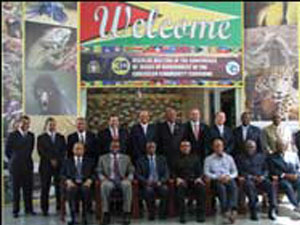|
|
|
CARICOM takes freedom of movement a step further

|
|
|
|
|
|
|
| CARICOM Leaders at Summit (Photo courtesy BBC Caribbean) |
| By: Melissa Bryant, SKNVibes |
|
|
|
|
BASSETERRE, St. Kitts – IN reaffirmation of their commitment to free movement of persons, CARICOM leaders agreed to work on a timetable for its full implementation and added household domestics to the category of workers allowed to move freely.
Those were some of the actions resulting from the 30th CARICOM Heads of Government meeting held in Guyana last week. Leaders from the 15 CARICOM nations and dependencies met over three days (July 2-5) to discuss areas relating to trade, crime and security, migration and CSME implementation.
The CARICOM Single Market and Economy (CSME) is a development strategy seeking to deepen the region’s economic and social integration. Implementation measures include a harmonisation of countries’ economic policies, a regional currency and the establishment of institutions such as the Caribbean Court of Justice and the Caribbean Public Health Agency.
Free movement within the region for certain categories of workers is a critical component of the CSME. These workers previously consisted of university graduates, artists, media workers, musicians, sports persons, teachers, associate degree holders and artisans with a Caribbean vocational education.
At a press conference following the summit, new CARICOM Chairman Bharrat Jagdeo revealed the conditions domestic workers would need to satisfy in order to qualify for free movement.
“Household domestics who have obtained the appropriate qualification will be allowed to move with effect from January 1, 2010. These workers will have to possess a Caribbean Vocational Qualification or equivalent qualifications,” he said.
The Guyanese President also revealed that an agreement was reached to review the schedule of free movement of persons within the CSME with the view of developing a comprehensive timetable at a Convocation in October.
Antigua and Barbuda and Belize are the only two nations exempt from allowing this new category of workers. Each country was granted a five-year reprieve, which, according to Antiguan Prime Minister Baldwin Spencer, was done so a study of the impact of free movement on their nations could be conducted. Antigua and Barbuda currently also has an exemption from free movement of non-graduate teachers and nurses.
Other positives arising from the meeting include the development of a protocol to ensure fair treatment of CARICOM migrants, increased workshops for immigration officers and the establishment of a passport-free zone within the region.
The issues of migration and free movement had been hot topics going into the conference, with Vincentian PM Dr. Ralph Gonsalves, Trinidadian PM Patrick Manning and Jagdeo alleging that nationals of their countries were mistreated by Barbadian immigration officials.
But by all appearances, the matter seems to be resolved. Speaking to reporters afterwards, Manning praised the “maturity” of his colleagues in finding solutions to problems.
“That is what an integration movement is all about. As difficulties arise, and they always will, we try to avoid these difficulties spilling over into conflict. ...in a mature way we sit down and address the problems and arrive at conclusions that will redound to the benefit of the integration movement.”
|
|
|
|
|
|
|
|